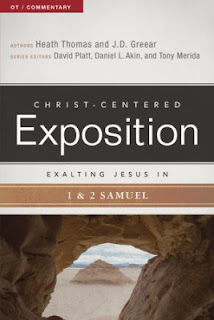Review: Exalting Christ in 1 and 2 Samuel
“And the king said to the guard who stood about him, ‘Turn and kill the
priests of the Lord, because their hand also is with David, and they knew that
he fled and did not disclose it to me.’ But the servants of the king would not
put out their hand to strike the priests of the Lord. 18 Then the king said to
Doeg, ‘You turn and strike the priests.’ And Doeg the Edomite turned and struck
down the priests, and he killed on that day eighty-five persons who wore the
linen ephod. 19 And Nob, the city of the priests, he put to the sword; both man
and woman, child and infant, ox, donkey and sheep, he put to the sword. 20 But
one of the sons of Ahimelech the son of Ahitub, named Abiathar, escaped and
fled after David” (1 Samuel 22:17-20).
How could this be in the Bible?
How could something this awful happen?
How could God permit it?
What are we supposed to learn from that?
How could Saul—whom God did choose as king, after all—do
that???
1 and 2 Samuel—a book with questions. A book in a historical
context far different from ours. What does it have to do with us? King David, a
good example, someone we want to be like but often feel like we’ll never
measure up. He was the great-great-something of Jesus, right? A king, right?
Chosen. Anointed. And the rest of the book? King Saul, evil spirits, battle
deaths, no-honey oaths, usurpation of the thrones, a royal history of a land we
can’t quite picture…
But the authors of Exalting
Jesus in 1 and 2 Samuel (Thomas & Greear) make a stunning claim:
“First and Second Samuel expose for careful readers the
horrors and hope of the real world” (7).
Really? And this story? Is Jesus exalted here in the story
of Saul, Doeg, Abiathar, and blood? Does this touch our lives at all? To draw
out and elaborate on some of the points made by Thomas and Greear:
Jesus is exalted by need—Saul, a man who rejected God and
shows the horror of a heart bent on its own pride. We see the horror of sin in
our own lives as we strike with the tongue. We see the horror of sin in the
news. The extreme depths of the horror of sin call for the extreme sacrifice of
Christ. May my heart break at my own sin, cry out for the sin in the world!
Jesus is exalted by contrast—Saul, the king. The king who
was supposed to reign in a way that mirrored God (Ps. 72), that brought God’s
justice and flourishing life. Instead, Saul reigned for himself and reigned
with blood. Saul shows how no earthly king will be the true King we need. In
our world of chaos—personal financial, relationship strife, hurricanes, wars,
when we feel tossed like pawns in forces greater than ourselves, we need a
king. Saul failed as a king—and serves as a foil for Jesus, our true King.
Instead of shedding blood, Jesus’ blood was shed. Instead of exerting power,
Jesus served. Instead of perpetrating injustice, Jesus was the victim of
injustice so that justice would ultimately come. Instead of killing the
innocent, Jesus died for the rebellious guilty. Jesus, I praise you for you are
greater!
Jesus is exalted by foreshadowing—one priest was saved. And
he ran to the anointed one, David. Anointed one—Hebrew meshaich. Transliterated into English as Messiah. A title we give
to Jesus. David, the one whose throne was promised to last forever. Yet, we see
David’s failure. But David pointed to Jesus who never failed. And Abiathar ran
to the Messiah, the Anointed One. He points us—where do we run to? Our Messiah.
Our Savior. Our King. My dear Lord!!! May I run to you in the dark horrors of
this world, run to you alone!
I have spent hours today in prayer for a friend, in grief at
others hardness of heart and sin. I am weak with pain and suffering. The
newspaper has the grave weight of a mountain and the force of a bomb on the
soul. Lives are ripped. Tornadoes—literal and relational—tear through our
world. You walk with your own burdens and joys. But we do not wring our hands
in despair. We do not fight, freeze, or flee. We do not despair. We do not grit
our teeth and hope for the best. We run to our King and we trust. The pain in
this world—see Jesus as greater. The hope we see in this world—a foreshadow of
the greater hope King Jesus will bring. He is our Messiah, Savior, True King.
We trust.
In a pair of Bible books of questions, books that can seem
distant, Thomas and Greear do an excellent, gospel-centered, Christ-exalting
way of bringing this book to our lives. For my full review, see here.



Comments
Post a Comment